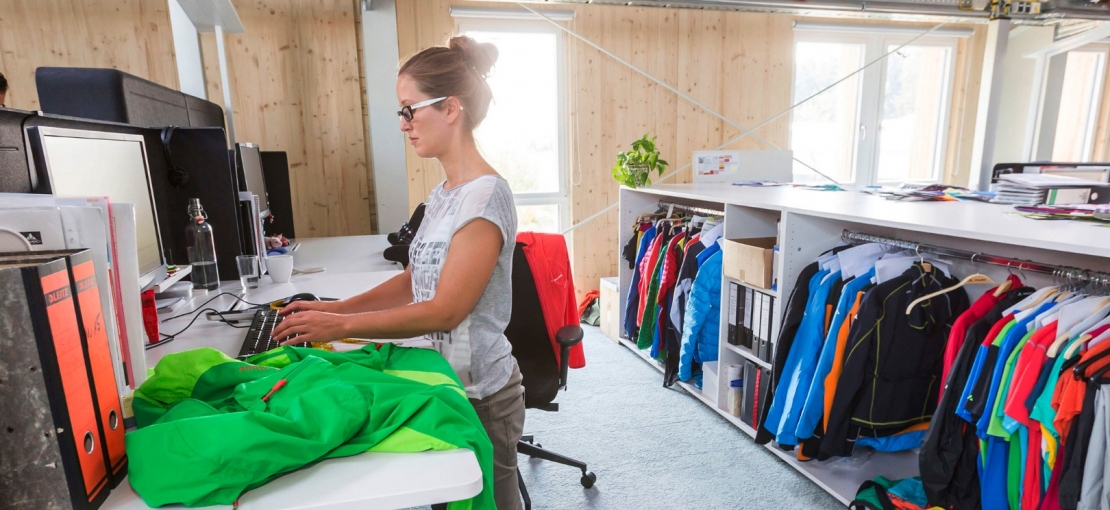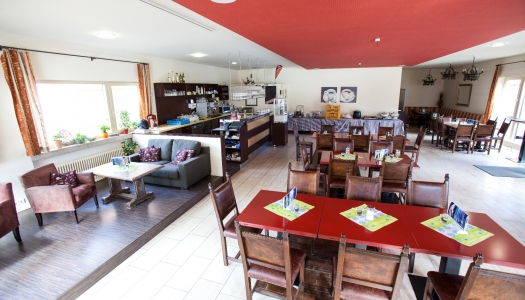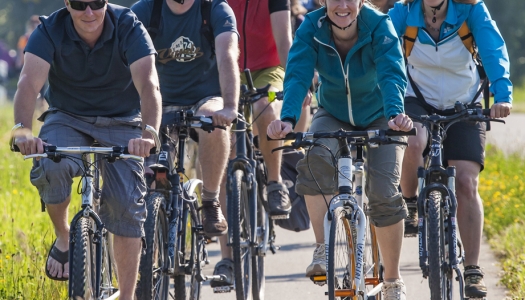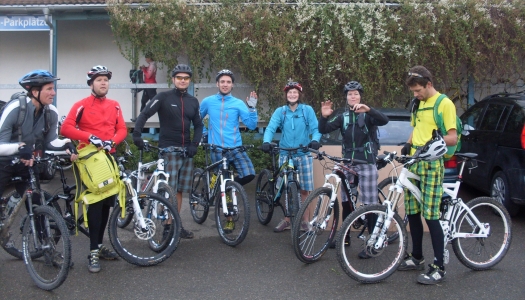
Safety is paramount
Active commitment to health
Only employees who are healthy and feel good can fully perform their services. As an outdoor brand, VAUDE wants to create appropriate compensation for desk work, and this applies to all employees.
It is also our mission as a company to ensure that our employees can work in a safe environment and with safe machines, especially in logistics and production. The focus of our health management system is on prevention and our employees’ active involvement in their own health.
Many individual health promotion activities
At VAUDE, we aim to pursue a holistic health management approach, including healthy food, prevention, exercise and sports, as well as office equipment based on ergonomic principles.
Occupational health management at VAUDE
Since 2014, we have been working on the establishment of a resource-oriented occupational health management system. The goals of resource-based health management are that employees become agents of their own health, come to understand health as a personal responsibility, engage in self-management and that VAUDE provides the appropriate framework.
We are supported by a team of experts from the company toMotion in the field of occupational health management. A standardized reporting system, which is based on quantitative and qualitative indicators, should be established to ensure that the interventions of the BGM can be selectively controlled. For this purpose, the plan is to collect anonymous data in 2015. This data is collected from standardized surveys (i.e. the Work Ability Index (WAI) and Trier Inventory of Chronic Stress (TICS)) on the subject of health, a detailed analysis of disability days and occasional measurements for heart rate variability. Targeted measures will be derived based on this data.
In 2015, the following measures will be implemented.
- raising awareness and a 6-week sports program for all managers
- stress screening (heart rate variability)
- health checkup with nutrition tips
- training of VAUDE health coaches who will implement programs for 150 employees
- coordination, control and evaluation of all measures by a health circle, consisting of employees and management from several areas of VAUDE
The integration of the BGM in the management system is of key importance to monitoring other interventions and making the BGM measurable and sustainable for VAUDE.
After renovation we will have an organic cafeteria and climbing area
To do justice to VAUDE’s growth and to modernize the company's premises in Tettnang-Obereisenbach, a major renovation project has been running since 2012 and will last until mid-2015. It includes, among many other things, a cafeteria.
The food in the cafeteria will be made from organic ingredients; VAUDE will subsidize costs so that employees will be able to eat a healthy lunch there. There is already a choice of two hot meals as well as various salads at the VAUDE Café daily where organic food is also offered.
As a mountain sports brand, we are very keen that our employees themselves remain active. We have supported this by building a climbing area with a total of 20 different climbing routes along 10 belay lines.

|
Organic food, naturally
There are already organic meals available at Café VAUDE. In the new cafeteria menus will also consist of organic ingredients. |
Ergonomic modernization
Over the course of the renovation, all office workstations are being modernized, taking ergonomic and environmental issues into consideration. All employees in administration will receive height adjustable tables; the offices will be equipped with sound-absorbing ceilings and floors, and floor lamps will be outfitted with daylight sensors.
This commitment to the health of our employees is also reflected in numbers: the ergonomically designed workstations alone will have cost the company 500,000 euros to complete.
53,672 km commuting by bike
VAUDE has long been a strong proponent of bike commuting. Some examples: eight loaner e-bikes, decentralized showers, covered bicycle parking and the like. In 2014 our employees rode 53,672 km to work and back, which represents a new and significant increase from the previous year (45,000 km).

|
Biking to work
Despite our hilly surroundings, many colleagues ride a bike to work. Overall, they have covered 53,672 km. |
Sports events in the VAUDE Academy
In addition, the VAUDE Academy program normally offers ten to 15 sports events per year, aimed at beginners and advanced students. Our employees can, for example, choose between mountain bike training and climbing courses, snowshoeing and trekking tours.

|
Staying fit
VAUDE promotes sports activities. Events for beginners and advanced are offered at the VAUDE Academy. |
We offer swimming classes on an as-needed basis at our outdoor pool or encourage our employees to participate in a weekly yoga class that’s free of charge. Our boulder room is always available to climbers. Every two weeks, we offer the option of „Massage at Work", with a trained masseuse who comes specifically to Tettnang-Obereisenbach.
Overtime and how to avoid it is also an issue at VAUDE. In order to act preventively against the accumulation of overtime, we follow an approach that is not just focused on employees’ presence at work but that includes goal achievement.
Dedicated work safety committee at VAUDE
To ensure safety, there is an ASA work safety committee at VAUDE. The ASA is managed by our representative for Occupational Safety and Security, and is composed of colleagues from company management as well as from logistics, manufacturing, maintenance and administration. An independent firm, Anwander (an engineering firm for Occupational Safety and Fire Protection) also attends the quarterly ASA meetings.
Accident statistics based on clear rules and standards
We follow clear rules from the Berufsgenossenschaft für Handel und Waren* for recording and disclosing accident statistics.
During the reporting period, we recorded no deaths or lost days caused by occupational illnesses. Overall, two employees, both female, were injured. Accident reports, however, are created at VAUDE only when sick leave is more than three days. Therefore, minor injuries are not covered. Per 200,000 hours worked, 0.62 accidents occured at our company. This is an accident rate of 0.62.
The injuries relate only to injuries occurring during work; commuting accidents are not considered. In 2014 no commuting accidents were reported, according to accident reports of the trade association.
The two injured employees had a total of 14 lost days, which correlates to a „lost day rate” of 4.10 as measured by the total hours worked of all employees, considered over the whole year 2014. This implies that per 200,000 hours worked, 4.10 lost days were due to accidents. The day of the accident is counted as the first day of absence with us.
Listed in the table below, injury rate* is calculated by the number of accidents, (= 2) compared to the total hours of all employees, (= 646,160 hours.)
Although we would like to avoid all accidents at work, the figures shown that we are on the right track. We have reduced the number of injuries by more than half and the associated lost workdays were also reduced extensively. All in all, we are very satisfied.
Goal: reduce absenteeism
Our absenteeism** (= all absences caused by illness, including accidents at work or occupational illnesses) was at 5.38 percent in 2014.
Thus, the absence rate is compared to 2013 increased slightly (absenteeism 2013: 5.35%). With this, we did not reach our goal for reducing absenteeism. However, with 9.44 sick days per employee, we are far below the national average of 14.7 days (Collection of the Techniker Krankenkasse see http://www.tk.de/tk/grafiken/gesundheitsreport/fehlzeiten/215980). We will continue to try to reduce the sick days rate. To this end, we rely on the above-mentioned activities under the occupational health management.
|
|
total | rate 2014 | total 2013 | rate 2013 |
|---|---|---|---|---|
|
deaths |
0 |
0 |
0 |
0 |
|
injuries |
2 |
0.62 |
5 |
1.58 |
|
lost days |
14 |
4.10 |
270 |
85.07 |
|
absences |
4.590 |
5.38% |
4246.5 |
5.35% |
Avoiding overtime is anchored in corporate objectives
The avoidance or minimization of overtime is one of our corporate objectives. The process of achieving goals and the monitoring and control is anchored in management and is subjected to an annual review - see "Sustainable business is worth it".
Emails do not have to be answered on weekends
To achieve these objectives, all measures and possible target figures are agreed upon. This is problematic for overtime, however, because working schedules and working hours are not recorded for all employees.
In particular, management level employees work on a trust-based system. Therefore, there were no specific figures for overtime. Rules such as ‘no email requirements on weekends’ contribute to the ability to avoid overtime.
Notes on the table above
* Occupational accidents include injuries which the employee incurs during working hours or on the way to work (so-called commuting accidents)
** Calculation of the quotas set out above:
- Injury rate: number of accidents (2) in relation to the total working time of all employees (646,160 hours) x 200,000
- Lost Days Rate: number of accidents caused by lost working days (14) in relation to the total hours worked of all employees (646,160hours) x 200,000
- Absenteeism: total days of absence all employees (4590 days) in relation to the total working days of all employees (82,344 days)
| GRI: | LA6 |
| GRI: | DMA Health and Safety |




